The
unbreakable
SAMUEL
L. JACKSON
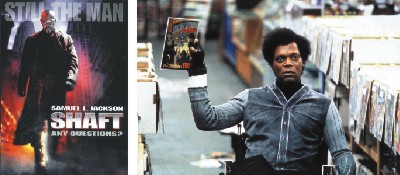
A
consummate professional, Samuel L. Jackson put in years of work with
small roles in small movies before a young director by the name of
Quentin Tarantino turned him into a Jherri-curled superstar and a
hollywood big shooter.
It
took almost twenty years for American audiences to finally put a name
to Samuel L. Jackson's face. Born in Washington D.C. on December 21,
1948, the actor was raised in Chatanooga Tennessee. Growing up, Jackson
was plagued by a stutter. He first got into acting after his speech
therapist suggested that auditioning for the college play might help
him get over the impediment. It worked, and Jackson soon switched
his major at Morehouse University to Drama. While attending the University,
Jackson became active in Civil Rights causes, and was expelled from
Morehouse for participating in a student demonstration. However, the
school took him back, and he graduated in 1972. Soon after, he moved
to New York to become a star.
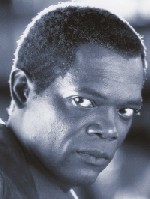
He
received some early acclaim working with the Negro Ensemble Company
of New York, and appeared in diverse theater productions. While it
offered paychecks, the money was still rather tight for the struggling
actor. Other, slightly bigger, paychecks came when Jackson landed
a job filling in for Bill Cosby on his hit 80s sitcom The Cosby Show.
Jackson's job was to keep the audience entertained between breaks.
Jackson
had also worked in movies, and had made his debut in the 1976 television
movie, The Displaced Person. From there it took five years for Jackson
to log his second credit, "Gang Member No. 2" in 1981's
Ragtime. Jackson's work over the next years continued to be mostly
in minute roles, "Hold-Up Man" in Coming to America, and
"Black Guy" in Sea of Love.
The
only man who would give him any real work was director Spike Lee,
who cast Jackson in such films as Do the Right Thing and Jungle Fever.
The two hit it off after Lee saw Jackson perform in a presentation
of A Soldier's Story. Jackson had long been a fan of the stage and
had garnered a good deal of success off Broadway. When he later had
the opportunity to be the lead in a version of August Wilson's Two
Trains Running on Broadway, he lost his job. The producers were apparently
scared off by Jackson's growing addictions to booze and crack cocaine.
Losing
the role was a wake-up call - and Jackson soon began to get his life
in order. Ironically, his first role as a clean and sober actor was
in Jungle Fever, playing the crack addicted brother of Wesley Snipes'
character. There was already a notable difference in Jackson's capabilities.
He won a special prize at the Cannes Film Festival for Best Supporting
Actor, a category they had never recognized before.
Better
roles followed, and gradually audiences began to recognize Samuel
L. Jackson's face. However, it was 1994's Pulp Fiction which really
blew audiences away. The actor nabbed a Best Supporting Actor nomination
for his turbulent role as a Bible-quoting hitman who thinks he's witnessed
a miracle and wants out of the business. Thanks to Quentin Tarantino,
Samuel L. Jackson was now a star.
Jackson
followed up with a fun turn in Bruce Willis' sequel, Die Hard With
a Vengeance and a powerhouse performance in John Grisham's A Time
to Kill. Since then, he has gone on to become one of Hollywood's most
popular leading men. His vivid energy comes across in everything he
does, and audiences can't seem to get enough. He has proven that he
can carry an action blockbuster - The Negotiator, and dazzle in supporting
roles - Jackie Brown.
Despite
the hype, The Phantom Menace opened to mixed reviews, and many fans
were disappointed with how little Jackson appears in the film. Still,
his character of Mace Windu is rumored to become more important in
the future prequels. Jackson has also recently completed the retro
remake of the Shaft. Watch out for his upcoming role as a swat team
specialist in the aptly named action movie SWAT.
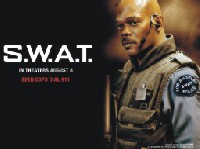
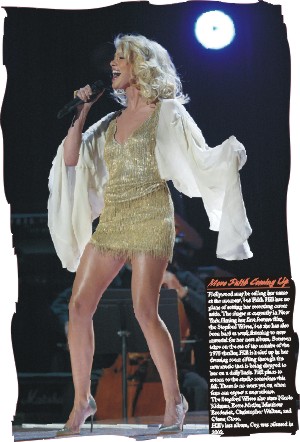
Runaway:
A Road Adventure
Runaway: A Road
Adventure is a new entry in the traditional adventure game genre from
Spanish developer Pendulo Studios. Well, Runaway is new to the United
States--the game's been available in Europe for quite a while, but
it's just now showing up on these shores with fully translated text
and English dialogue. In the fast-paced world of PC games, a delay
of just a few months can make your game look dated when it's finally
released, so you might expect a delay of well over a year to be Runaway's
death knell. However, adventure games depend more on creativity than
technology, and it's for this reason that Runaway is just as enjoyable
today as it was when it was originally released. The game is a reasonably
well-made attempt at revitalizing the adventure game spirit of old,
and though it may not quite live up to the standard-bearers of the
genre, it's certainly of sufficient quality that adventure fans should
give it a look.
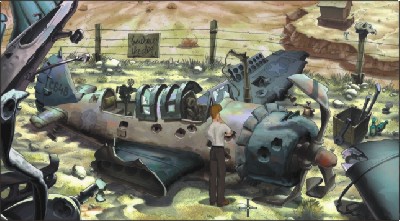
The
story in Runaway follows Brian Basco, a recent college graduate based
on the East Coast who's looking to continue his studies out West.
Brian takes off on a road trip so he can begin a postgraduate stint
at UC Berkeley, but he doesn't even make it out of town before his
plans are reduced to shambles by a collision with damsel in distress
named Gina. Brian's big heart demands that he help Gina, who is not
surprisingly being pursued by some jackbooted mafiosi, and together
they take off to flee the thugs and also discover the secret of a
mysterious artifact entrusted to Gina by her slain secret-agent father.
If this setup sounds a little far-fetched, it is, but as you wend
your way through the plot, you'll find a fair number of interesting
places and people, as well as some unexpected twists (especially toward
the end). Overall, the story is pretty evenly paced and should satisfy
all but the most discriminating gamers.
If you've played
just about any point-and-click adventure game from the past decade,
you'll be right at home with Runaway's control scheme. If you click
a spot on the ground, Brian will walk there. The cursor is context-sensitive,
so if you pass over an object, you'll get a magnifying glass that
lets you examine it, and if you highlight a path for moving offscreen,
you'll get an arrow that lets you go there. Hitting the right mouse
button lets you cycle through any other relevant actions, such as
operate or take. Your inventory is available at the touch of the Tab
key, and you can even move to a new screen without waiting for Brian
to walk there by double-clicking (which is a huge time-saver). The
puzzles are almost all of the "combine item A with item B and
apply to hot spot C" nature, which is what you'd expect of an
inventory-based adventure game, though there's a good amount of dialogue-tree
character interaction going on as well. In gameplay terms, Runaway
is pretty much by the numbers, but it works well for what it is.
Visually, Runaway
has a lot of panache. Adventure games are scarce enough as it is these
days, and it seems like most of the ones that do come out use CG as
the basis for their backgrounds, whether they're real time or pre-rendered.
Given this, Runaway's look is refreshingly traditional. It features
a huge number of lovingly hand-painted backgrounds that will remind
longtime adventurers of their old favorites, and the character models
are cel-shaded 3D models that animate very well and blend in perfectly
with the backgrounds.
The
voice acting, alas, ranges from pretty good to pretty bad, and it's
even glaringly obvious in a couple of spots that the same actor or
actress was used to voice multiple characters. None of the voice acting
is so horrendous that you'll want to cover your ears (or just turn
off your speakers), but it does detract from the charm of the game
somewhat.

Runaway has a
few other shortcomings. For instance, the game just isn't as humorous
as it could have been. Perhaps it's because this version of the game
is a translation, but the humor demanded by some of the game's story
elements, like a trio of drag-queen divas stranded in the desert,
isn't quite there, at least not in force like it ought to be. The
writing isn't a total bore, but you won't get the constant one-two
comedic punch as you would from a game by Tim Schafer or the Two Guys
from Andromeda. On the technical side, some of the objects you're
meant to interact with are nearly impossible to pick out from the
backgrounds, and you'll probably end up having to comb every pixel
with your cursor looking for a hidden hot spot before you locate certain
essential items. This can be a real pain sometimes, though on the
other hand, it does make you pay more attention to the details in
the game's art. Finally, some of the puzzle solutions are really on
the odd side and not entirely logical.
Nevertheless,
if you've been searching for an adventure game worth your while, Runaway:
A Road Adventure is for you. It has pretty much everything you'd want
out of a solid adventure experience, like diverse settings, a good
storyline, wacky characters, and lots of complex puzzles. Even if
some of its elements aren't up to the standard set by the greatest
adventure games ever released, Runaway is still a good game that's
recommendable to fans of the genre, as well as those who maybe haven't
tried this style of gaming before.
